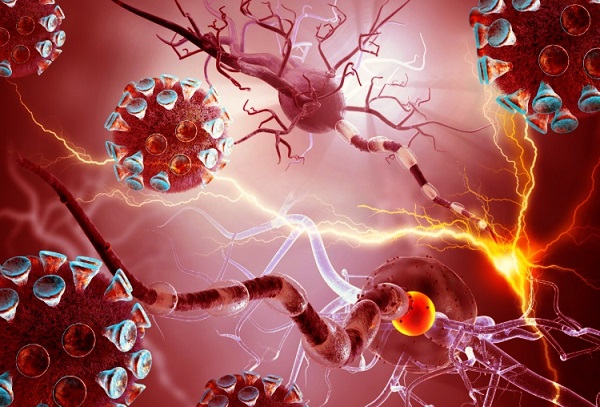Nikhil Prasad Fact checked by:Thailand Medical News Team Aug 08, 2025 6 months, 2 weeks, 1 day, 17 hours, 19 minutes ago
Medical News: New Study Links COVID-19 Proteins to Potential Long-Term Brain Damage
A team of researchers from the University Medical Center Göttingen in Germany, China Medical University in Shenyang, Lund University in Sweden, the Max Planck Institute for Multidisciplinary Sciences in Germany, Newcastle University in the UK, and the German Center for Neurodegenerative Diseases has uncovered alarming evidence that specific SARS-CoV-2 proteins can directly damage brain cells and may contribute to long-term neurological issues.
 SARS-CoV-2 Proteins Found to Damage Brain Cells and Trigger Inflammation
SARS-CoV-2 Proteins Found to Damage Brain Cells and Trigger Inflammation
While COVID-19 is widely known for its respiratory symptoms, many patients—especially those with long COVID—continue to report persistent brain-related issues such as memory loss, headaches, and confusion. In this
Medical News report, scientists have now identified two major ways these viral proteins harm the nervous system: by forming harmful protein clumps inside cells (similar to those found in Alzheimer’s and Parkinson’s disease) and by triggering damaging inflammatory responses in brain immune cells known as microglia.
Protein Aggregation and Inflammation – A Dangerous Combination
The study examined 10 different SARS-CoV-2 proteins and found that several—particularly ORF6, ORF7a, ORF7b, and ORF10—showed a strong ability to clump together inside cells. These aggregates can disrupt essential cell processes, especially in neurons, where protein build-up is known to be toxic. In laboratory tests, these proteins also activated microglial cells, leading to the release of inflammatory chemicals such as TNF-α and IL-6. This type of chronic inflammation is strongly linked to brain cell damage and long-term neurodegenerative diseases.
How the Virus Disrupts Key Cell Functions
Detailed cell studies revealed that ORF6 was especially harmful, disrupting the endoplasmic reticulum (ER)—a key structure in cells that manages protein processing—and interfering with the autophagy-lysosome pathway, which is responsible for clearing out damaged proteins. This double attack both increases harmful protein aggregation and blocks the cell’s ability to clean up the mess, creating a vicious cycle of damage.
Interestingly, when the researchers used Torin1, a compound that stimulates autophagy, the amount of protein clumping caused by ORF6 and some other viral proteins dropped significantly. This suggests that boosting the cell’s natural cleaning systems could be a potential treatment approach, although more research is needed before it could be applied in humans.
Why This Matters for Long COVID
The findings help explain why so many COVID-19 survivors—especially those with long COVID—experience ongoing neurological problems. The study shows that even without full viral infection, just the presence of certain viral proteins in brain cells is enough to cause toxic changes. This means
that lingering viral proteins in the body could continue to cause harm long after the initial infection has passed.
Final Thoughts
These results highlight a possible direct link between COVID-19 and the development or worsening of neurodegenerative diseases. By showing that specific SARS-CoV-2 proteins can both damage brain cell structures and spark harmful inflammation, the study opens the door for new therapies aimed at protecting the brain in COVID-19 survivors. Preventing or reducing these effects could be crucial in lowering the long-term neurological burden of the pandemic.
The study findings were published in the peer reviewed journal: Scientific Reports
https://link.springer.com/article/10.1038/s41598-025-10013-1
For the latest COVID-19 News, keep on logging to Thailand
Medical News.
Read Also:
https://www.thailandmedical.news/news/shocking-eye-and-brain-disorders-found-in-covid-19-patients-in-nepal
https://www.thailandmedical.news/news/covid-19-triggers-brain-neural-chaos-through-a-piezo2-malfunction
https://www.thailandmedical.news/news/study-shockingly-finds-that-the-nucleocapsid-protein-of-the-covid-19-virus-triggers-brain-cell-aging
